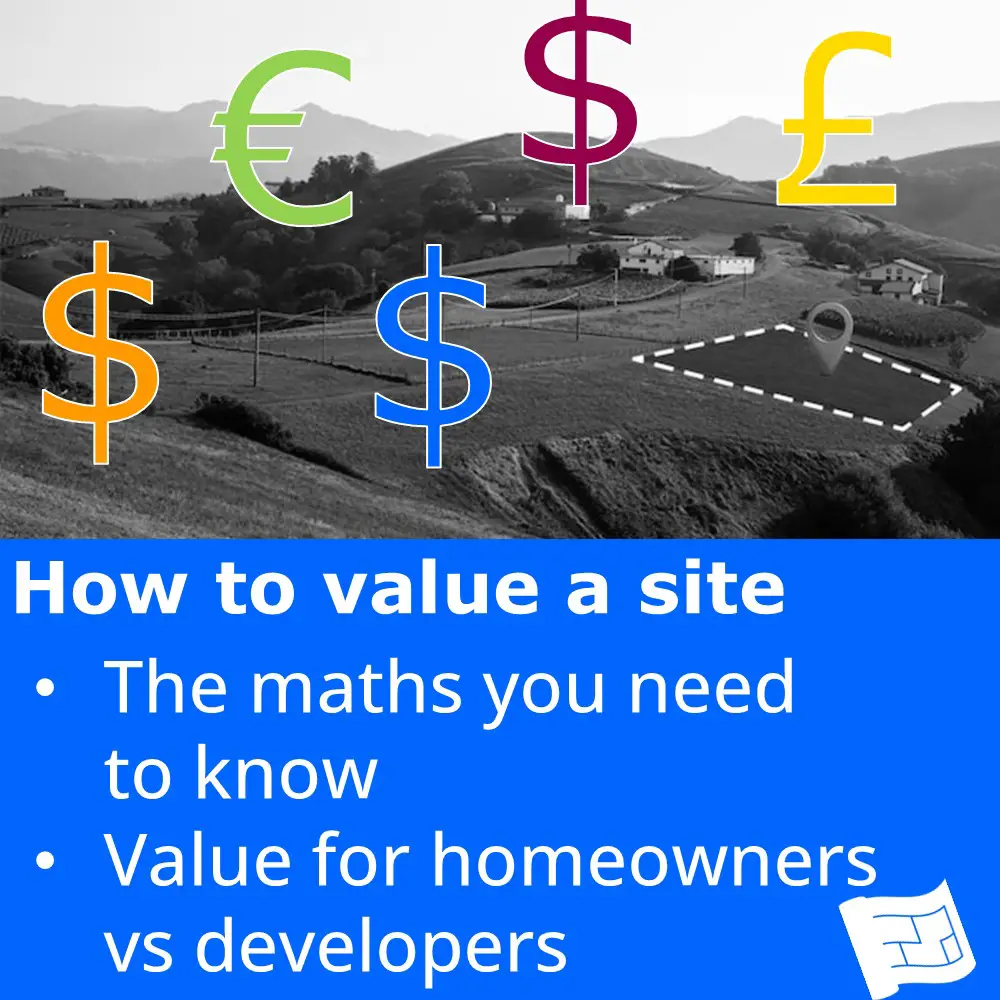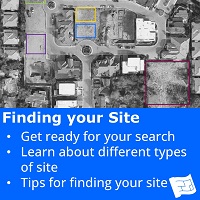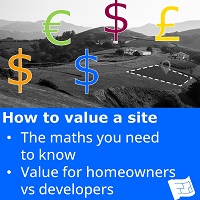- Home
- Your Lot ¦ Plot ¦ Site
- Finding Your Site
- How to value a site
How to value a site
It's easier than you think to overpay for a site, especially when you're in competition to buy a piece of land, perhaps even in the throws of a live auction.
To avoid this, spend some time about learning how to value a site and appreciate the value not only to you, but to other parties that might be interested in the site (ie developers). That way you will understand your budget for finding your site.
Here's the equation that you'll need to become very familiar with
Final value of Home = (Value of Site + Build Cost) x Profit Margin Factor
The final value of the home refers to the amount of the finished home, built on the land including any taxes.
The value of the site is the value of the land, plus any existing property on the site, plus any applicable taxes.
The build cost is the cost of building the home including any taxes.
The profit margin factor (PMF) refers to any profit or equity in the final home.
PMF = (100 + profit percentage) / 100
- PMF = 1 - no profit
- PMF = 1.05 - 5% profit
- PMF = 1.2 - 20% profit ... and so on
Now that the definitions are in place, we can do a bit of algebra wizardry to get...
Value of Site = (Final Value of Home / Profit Margin Factor) – Build Cost
Site valuation - You vs Developer
Now let's discuss how to find out more about each of the elements that go into the value of land and how they might be different for you as a homeowner versus a developer.
Final value of your home
You've probably got an idea of the type and size of home that you're looking to buy. A quick check with a real estate agent will give you an idea of how much a similar home would be to buy.
Remember to ask the estate agent to take into account the fact that the home will either new, or remodeled when researching your equivalent price.
Now - let's look at the final value of the home from a developer's perspective. Remember that a developer will be thinking about the biggest house they can fit on the site, or perhaps thinking about building several homes on a site in order to maximize the value.
So - it's back to the real estate agent to find out about what's the maximum value of the home or homes that could be built on the site.
Keep these two numbers - your home value and the developer's home value in mind when thinking about how to value a site.

Add the tax / duty
Don't forget to add any stamp duty or other tax applicable on to the value of your home. While you won't be paying this tax / duty (you'll be paying it on the value of the site if it's applicable) it represents what it would cost someone else to buy your home and therefore should be added to represent the full value.
As a homeowner you have a slight advantage here because a developer will need to charge tax on the price of the build when they sell it. This means they need to keep their build cost down in order to have a home that will sell at a competitive price.
Build Cost
Next we'll tackle build cost.
Unless you're a builder yourself you'll need to do some initial research into construction costs.
Don't forget to include other items in the build cost such as:
- Legal fees like broker fees, legal fees, title search, recording fee
- Insurance
- Cost of living in another residence during construction if necessary
- Professional fees (design services, surveys, engineers etc)
- Permit fees
- Landscaping and planting
Now if we look from a developer's perspective, many of them will be builders themselves and will therefore be able to keep their build costs low. Much of the profit they are looking for will come from the build cost, with some coming from the added value having made the effort to execute the project.

Add the tax
Again, don't forget to add the tax. As a homeowner you'll pay tax on the materials and labor that goes into building your home.
A developer will be able to recoup the tax paid for the build cost because they are paying for the build as a business.
Profit margin factor (PMF)
As a homeowner, you may not require a profit from your new build or remodel. But there are a few other ways to think of this 'profit'.
Building your own home takes alot of effort, sometimes described by the expression 'sweat equity'. You are putting this project together and you can take the view that you should make the numbers work so that you can be paid for that (or so that the sweat equity can be stored in the value of your home).
Adding a profit addes some contingency to your budget. If anything is more expensive as planned, you'll be eating into the profit rather than running out of money.
Obviously a developer will be looking for a profit. I'd use a PMF of 15-20% for developers. Again - ask your local real estate agent for advice on this as well.
Wrapping up
The equation and discussion above is a simplified version of the maths involved. If you get the chance to talk to a real estate agent or developer they may be kind enough to work with you on how to value a site so that you can work out the budget for your site.





